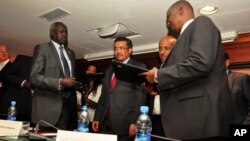South Sudan marked a solemn anniversary last Friday: it has been a year since both sides in the conflict signed a cessation of hostilities agreement.
The agreement has been violated repeatedly since it was signed on Jan. 23 of last year, and South Sudan remains mired in conflict.
Nearly two million people are displaced, hundreds of thousands are living in camps for internally displaced persons or as refugees in neighboring countries. No official death toll has been released for the conflict, but at least 10,000 have been killed.
On Monday, President Salva Kiir blamed forces loyal to his former deputy, Riek Machar, for the numerous breaches of the cessation of hostilities agreement.
He said the agreement has "...never been respected by Riek Machar and we have been abiding by our commitment not to violate the ceasefire... This has become too much. Our forces just wait in their positions to be attacked."
Machar, meanwhile, told South Sudan in Focus last week that the blame for lack of progress toward peace lay with the government. Machar said the cessation of hostilities "...is not being respected because of the presence of foreign forces" in South Sudan. He said Ugandan troops, deployed at the beginning of the conflict to help the government to secure the capital, have not yet withdrawn, and "four groups of Sudanese rebels" are fighting on the side of the SPLA.
Arusha agreement
Days before the one-year anniversary of the cessation of hostilities agreement, Mr. Kiir and Machar signed a document aimed at healing the many rifts in the Sudan People's Liberation Movement (SPLM) that triggered the conflict in the first place. That agreement, which was signed in Arusha, Tanzania, includes a clause recommitting to the cessation of hostilities pact.
On Friday, U.N. Secretary General Ban Ki-moon called for the Arusha agreement to be implemented immediately. Ban singled out the need for both sides to respect the cessation of hostilities agreement. "Time is running out" to make peace, he said.
He urged the warring sides in South Sudan to use the upcoming summit of the Intergovernmental Authority on Development (IGAD) -- the East African organization that brokered the cessation of hostilities agreement and, for more than a year, has been waging a diplomatic campaign to restore peace in South Sudan -- to reach an agreement to end the conflict.
Troika calls for peace
Also on Friday, the troika for South Sudan -- which is made up of the United States, United Kingdom and Norway -- issued a statement acknowledging the signing of the Arusha agreement by SPLM factions loyal to Mr. Kiir, Machar and a group of former party officials who were detained when the conflict began in December 2013, on suspicion of plotting to oust Mr. Kiir.
Like Ban, the troika admonished the warring parties in South Sudan to do much more to restore peace in their country.
The three countries commended IGAD for its persistent diplomatic efforts to end the fighting in South Sudan. But, they added, the government of South Sudan and Machar's rebels have wilfully obstructed peace efforts.
The troika said it is deeply disappointed by the continued violations of the cessation of hostilities agreement and by the warring sides' unwillingness to "make the compromises needed to achieve a viable peace agreement."
The people of South Sudan will not remember who committed crimes against humanity in South Sudan and dragged them into this senseless civil war. But certainly they will remember the silence of their friends.Amir Idris, Fordham University
Machar told South Sudan in Focus on Friday that he intended to take the Arusha agreement to the IGAD summit meeting in Addis Ababa at the end of the month.
"I'll tell them to make use of it. It resolves issues of accountability, reconciliation, reparation and compensation, and that's why I signed it," Machar said.
But analyst Amir Idris, who is the chair of the Department of African and African American Studies at Fordham University in New York, said the Arusha agreement falls short on several fronts -- including the key issue of finally making peace in South Sudan.
Idris said there "is no mechanism" in the Arusha pact to enforce the cessation of hostilities agreement. "It seems to me there is a vacuum," he said.
Idris said the international community has a lead role to play in ending the conflict in South Sudan. "The people of South Sudan will not actually remember who committed crimes against humanity in South Sudan and dragged them into this senseless civil war. But certainly they will remember the silence of their friends," he said.
Philip Thon Aleu and John Tanza contributed to this article.






